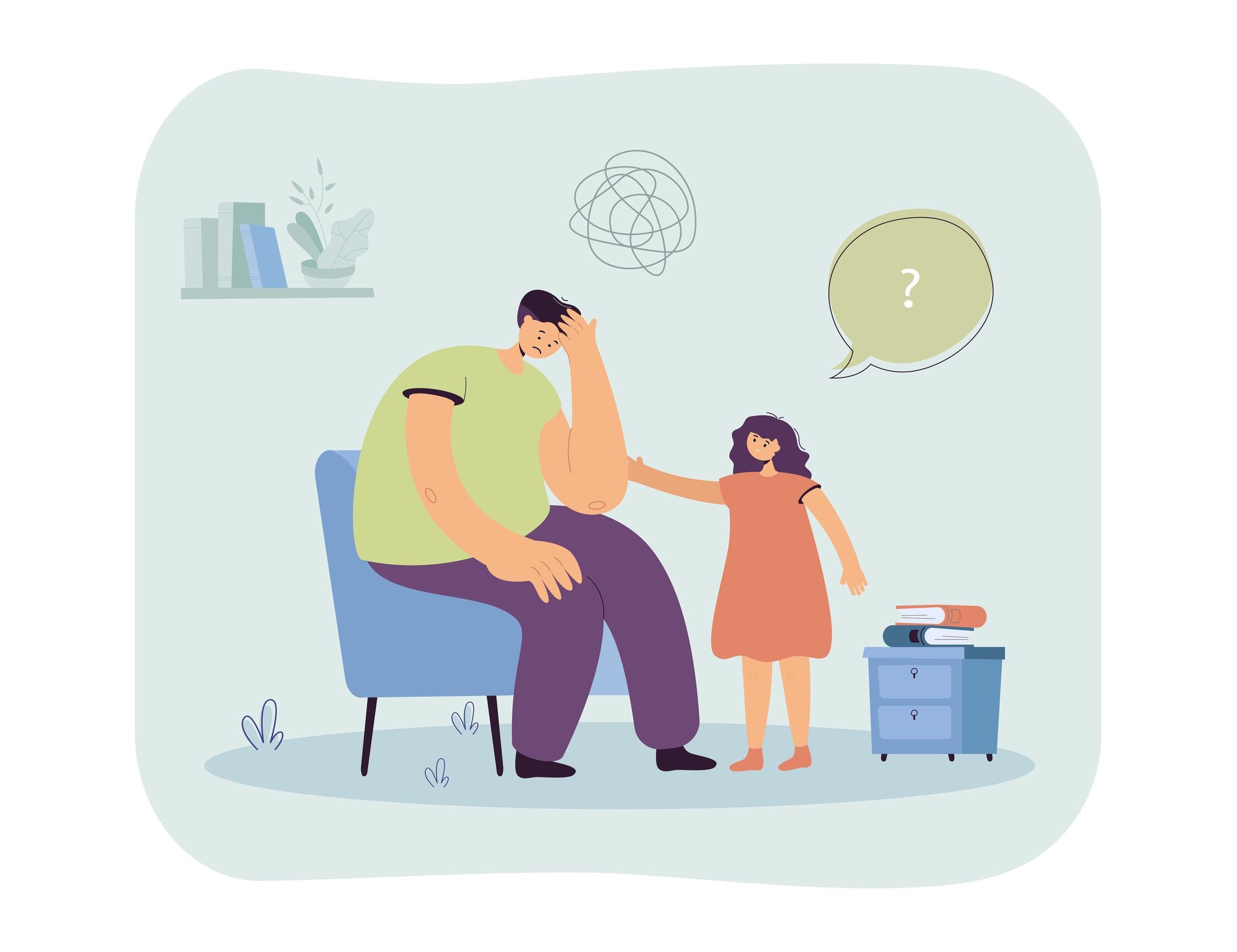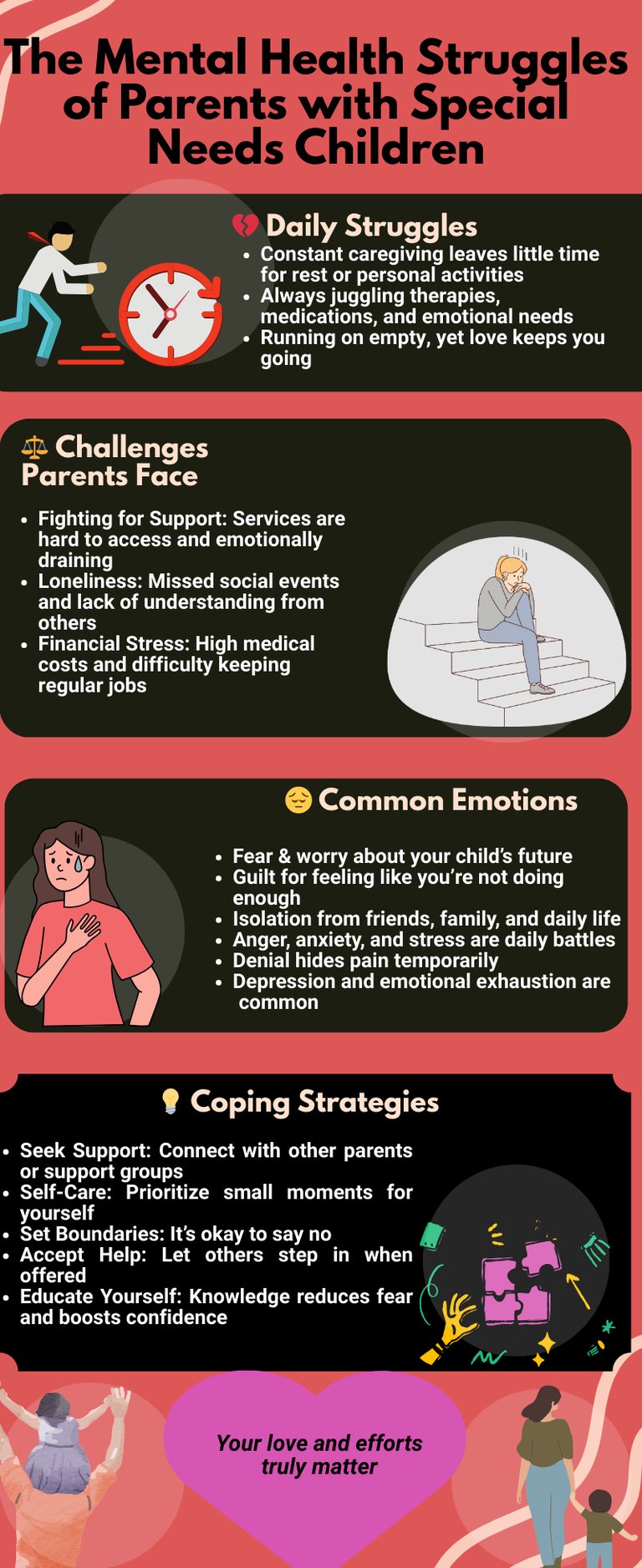Mental Health Struggles of Parents with Special Needs
Parenting is one of the most beautiful and rewarding experiences in life. However, when you’re raising a child with special needs the journey can feel much harder and that’s okay.
Faiza Zulfiqar
6/2/20256 min read


Parenting is one of the most beautiful and rewarding experiences in life. However, when you’re raising a child with special needs the journey can feel much harder and that’s okay. It becomes more demanding and sometimes more isolating. Every day can feel like you're climbing a hill with no rest. You may feel emotionally and physically drained. If you're a parent on this journey, this blog is for you. You're not alone. The struggles you face are real. They are valid. This guide will walk you through the emotional, social, and financial challenges of parenting a child with special needs. It will also show you ways to cope, survive, and thrive. You are strong even when you feel exhausted and yes, there is support out there for you.
Remember, your strength is greater than you realize. It’s okay to have tough days. You are doing an incredible job. Every step you take no matter how small it is a testament to your resilience. You’re not alone in this journey. Keep going and you’ve got this.
The Daily Struggles: Recognizing the Weight You Carry
Every day might feel like you're always busy and never getting a break. The care your child needs can be very demanding. You may feel like you have little to no time for other activities. Something always needs your attention from scheduling therapies and medications to making sure your child feels comforted and happy.
Sometimes, you may feel like you’re running from one thing to another like a ball of yarn being chased by a cat. You’re always moving and always trying. You might feel like you're reaching your breaking point. But you don’t. Why? Because your love for your child is powerful and unshakable. It keeps you going, even when you feel completely drained. You are amazing and the love and care you show your child is a true reflection of your big heart.
1. Fighting for Services and Support: Understanding the Challenges You Face
Finding proper services can be exhausting. It becomes even more difficult when those services are meant for children with special needs. Whether you’re trying to access special education, healthcare, or basic respite care, the process can be draining. It’s frustrating and it never seems to get easier. You may feel like you're always fighting, advocating for your child, and standing up for their rights. That constant battle can wear you down. It affects your mental and emotional well-being. Many times, the systems in place look helpful on paper. However, in reality, they feel like a confusing maze, or worse—a game you can’t win. It's easy to feel lost in it. However, even when the path feels unclear, remember you’re doing your best, and that’s more than enough.
2. Coping with Loneliness and Social Isolation
Parents of special needs children often feel isolated. It’s a quiet kind of loneliness — the kind that doesn’t always look obvious but cuts deep. You may miss out on family gatherings. Maybe you skip social outings. Even a simple playdate might feel out of reach. Sometimes, your child’s needs don’t allow them to participate like other children do. Other times, it's because people just don’t understand. That isolation grows. It wraps around you. You begin to feel disconnected from others. It's not just about missing out on having fun. It’s about not having people who understand what you're going through, someone to talk to, and not having someone to count on. That hurts more than people realize.
3. Balancing Financial Pressure and Work Challenges
Raising a child with special needs isn’t just emotionally hard. It’s financially demanding too. Doctor visits, therapy sessions, treatments, and special equipment — all of these things cost money. On top of that, keeping a regular job can be hard. Your child might need care and attention all the time. That means missed workdays, late arrivals, or even quitting your job. Trying to juggle both — your responsibilities at work and your duties at home can feel impossible. The stress piles up. You may start worrying about the future, money, and what happens next. That kind of pressure? It can feel unbearable.
4. Understanding Your Emotions: It’s Okay to Feel This Way
Your emotions are valid. Every single one of them. Here are just some of the feelings that might come up on this journey:
I. Fear and Worry
The fear never really leaves. It sits in your chest, and there is constant concern about your child’s comfort and safety. You worry about their future, happiness, and their well-being. These thoughts keep you up at night. They add weight to your heart.
II. Guilt
Sometimes, you feel helpless when it comes to protecting your child. You might feel like you're not doing enough and blame yourself for not being able to fix things. No matter how much you do, it never feels like enough and the guilt can be overwhelming.
III. Isolation
You may feel cut off from the world. Family outings, friendly meetups, and even holidays may all feel out of reach. Not because you don’t want to go, but because your child’s needs are a priority.
IV. Anger, Anxiety, and Stress
These emotions often show up together. You might feel angry at the situation or even at yourself. That’s okay. It’s normal. Anxiety becomes a daily visitor. And stress? It lives in your body like a shadow.
V. Denial
Sometimes it’s easier to pretend everything’s fine. To push the hard stuff away. However, denial doesn’t make the pain go away. It just keeps the pain out of sight for a little while.
VI. Depression or Feeling Down
It’s okay to admit you’re struggling. You may feel like the joy is gone or like you’re stuck under a heavy cloud. You are not alone in this. Many other parents feel the same.
VII. Exhaustion
This kind of tiredness isn’t fixed by sleep. It’s deep and emotional because you give so much of your time and energy every day. It's completely okay to admit, 'I’m exhausted,' because you truly are.


Finding Strength and Healing: Coping Strategies for Special Needs Parents
You’re stronger than you think, and you don’t have to go through this alone. Here are a few ways to care for yourself while caring for your child:
I. Seek Support
Reach out to other parents who are going through the same thing. Join support groups at online forums or in person. It’s comforting and helpful to have friends who are also parents going through a similar experience. You learn useful tips from them on how to manage difficult situations.
II. Practice Self-Care
Practicing self-care is so important. It gives you some sort of self-satisfaction that you've done something just for yourself. Take a walk, relax in the bath, or listen to music, do whatever makes you feel good and happy. It's important to take time for yourself. You’re important, too.
III. Set Boundaries
You don’t have to say yes to everything. Protect your time and energy. It’s okay to say no when you need to since taking care of your mental health means being able to draw certain lines.
IV. Accept Help
Let people help you. If someone offers to watch your child, say yes. If a friend brings you dinner, show your gratitude. There’s no shame in needing help.
V. Educate Yourself
Learn about your child’s condition. Find out what services are available. The better informed you are, the more manageable things become. Understanding things can lessen fear and help you feel more in control.
Final Thoughts: Acknowledge Your Courage and Care
Raising a child with special needs is a journey filled with love, struggle, and resilience. Your strength is inspiring. It’s okay to admit that you’re tired. It’s okay to ask for help. However, please remember this: you don’t have to do everything alone. You deserve care and rest, too. There is hope. There is support. There is strength to be found—even in the hardest moments.
Every step you take to learn and understand helps. It might feel hard now, but you’re doing better than you think. With time, things can get easier. Keep going. Your love makes a big difference.
FAQs: Mental Health of Parents with Special Needs Children
1. Is it normal to feel overwhelmed as a parent of a child with special needs?
A: Yes, it’s completely normal. Parenting a child with special needs comes with many emotional, physical, and mental challenges. Feeling overwhelmed doesn’t mean you are weak. It means you care deeply.
2. What can I do if I feel lonely and isolated?
A: Try to connect with other parents who are going through the same thing. Join online or local support groups. Talking to someone who understands your struggles can make you feel less alone.
3. How can I take care of my mental health when I have no time?
A: Start small. Even 5–10 minutes of quiet time, deep breathing, or walking can help. Taking care of yourself is not selfish. It makes you care better for your child.
4. Where can I find help or support?
A: You can talk to a therapist, social worker, or counselor. Look for local nonprofits or online communities that support parents of children with special needs. Schools and hospitals may also guide you.
5. What if I feel guilty for needing a break?
A: Don’t feel guilty. Everyone needs rest. Taking a break doesn’t mean you don’t love your child. It means you are human. Rest helps you come back stronger.
